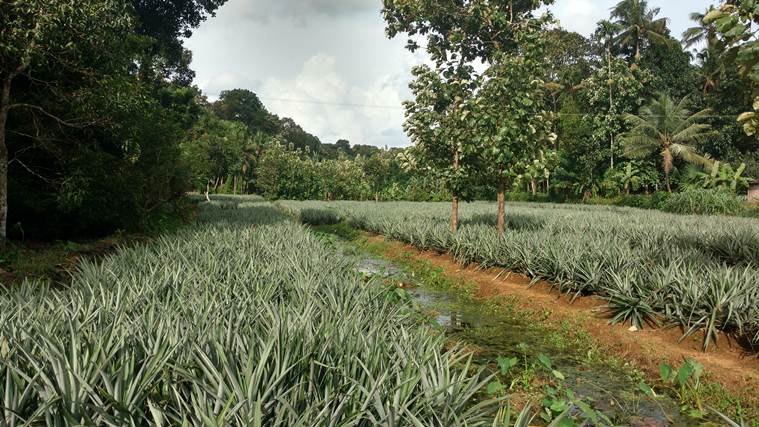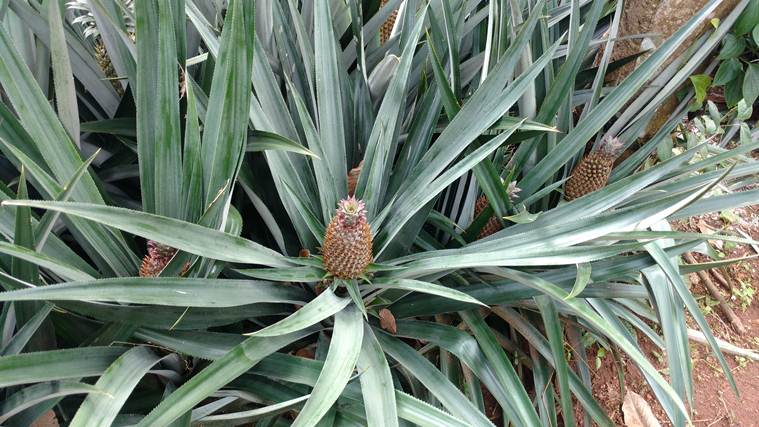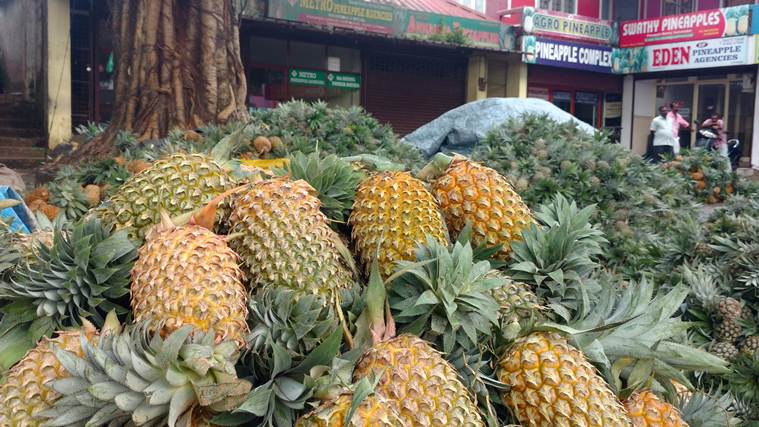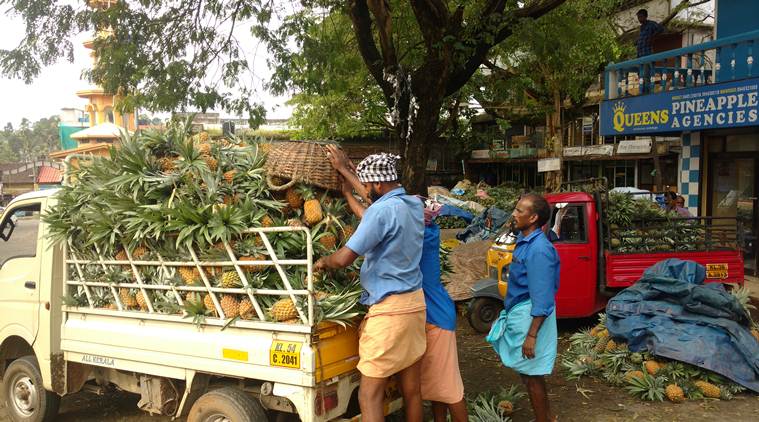Our fruits are safe, buy them: Farmers in Kerala’s pineapple hub thrash rumours
Vazhakulam, located on the western edge of Ernakulam district, is Kerala’s pineapple country. Within a 20-km radius of the modest town, nearly 3500 farmers cultivate the tropical fruit on about 8000 acres generating about 80,000 tones of produce annually. Even the air here on the main street of the town carries a whiff of the locally-grown, GI-tagged variety known as ‘Kannarachakka’, which has a rough, spiny marking shaped as ‘fruit eyes’. While 90 per cent of the produce is shipped off to other states in India and Middle East countries, only the ripe fruit is consumed and processed in the state.
Lately, the farmers in Vazhakulam haven’t been having the best time. An advanced monsoon, which came almost a week before the original onset, spoiled their harvest calculations. Following a temporary decline in fruit exports due to the Nipah virus outbreak, the cultivators have a new problem on their hands: ‘unfounded’ rumours and allegations of excessive use of pesticides floating through social media platforms aimed at wrecking their business. They fear that the rumour-mongering could seriously upset the prospects of one of the few fruits that get exported from the state.
“The pineapple we cultivate is not certified organic so we do use minimal pesticides and foliar fertilisers. All farmers here and outside Vazhakulam strictly follow the ‘package of practice’ prepared by the Kerala Agriculture University (KAU) which recommends the pesticide levels. Since the spraying is largely mechanised, locals who see it think we are spraying endosulphan or something. They get scared and they spread rumours,” said Baby John, a farmer and executive director of the Vazhakulam Pineapple Growers & Processors Pvt Ltd (VPGP).
“The terminology they use in these messages is always cliched: ‘marakamaya visham’ (dangerous poison), they say. There’s no rationality to this. There’s never any evidence of lab results of the pesticide content along with these messages. They are just meant to spread fear and panic among the people. The local politicians take advantage of this because they want to develop vote-banks,” added John, who cultivates pineapples on nearly 400 acres of leased land across the state.

Baby John, standing in his plantation said, they have decided to take legal actions against people spreading rumours. (Express Photo by Vishnu Varma)
As evidence, John points to a Facebook screenshot on his phone which has the photo of a baby alongside a worker spraying pesticide. A line beside the photo, written in Malayalam, is translated as, “Disown pineapple consumption in Odungakkad and Malathukuzhy areas. It is polluting our water and soil sources and leading to dangerous diseases.”
“This is from last year. I spend ten minutes everyday explaining to people that all of this is not true,” said Baby,. “My point is simple, get a sample and get it tested. If anyone is culpable, he should be punished. If a farmer uses a pesticide outside of the KAU manual, it should be barred. But at least, get it confirmed before spreading rumours.”
According to the KAU, the pineapple crop in Kerala does not signal any serious pests or diseases, except for ‘light incidence of leaf spot disease and mealy bugs.’ It recommends fungicides such as Bordeaux mixture, Zineb or Mancozeb for leaf spots and 0.05% of quinalphos for the control of mealy bugs. Additionally, for uniform flowering of the crop, it recommends a hormone such as a mixture of 25 ppm ethephon in aqueous solution containing 2 per cent urea and 0.04% calcium carbonate.
Dr Maya T, head of the Pineapple Research Station at Vazhakulam, attested that a pesticide control lab based in Thiruvananthapuram takes random samples from retail markets during the consumption phase and regularly analyses them for anomalies. But over several years, such anomalies have never been reported.
“In case of pineapples, excessive pesticide contamination has never been reported in Kerala. That’s why we still follow the ‘package of practices recommendations’ of KAU. We are very confident about this. It is important that scientific reasons are cited because farmers will be severely affected (by such rumours),” she said over the phone.

The pineapple farm in Vazhakulam’s Kerala. ( Express Photo by Vishnu Varma)
At the local pineapple market in Vazhakulam, where hundreds of kilograms of ripe fruit were being ferried to retail markets in small pick-up trucks, a sense of anxiety about unfounded reports was very much palpable.
“I haven’t yet come across such rumours on WhatsApp, but I heard it from other people. It’s a very serious situation. If they go unchallenged, it will create a lot of problems for us especially because most of our produce go to other states,” said Antony, a supplier sitting in his office.

Advanced monsoon, which came almost a week before the original onset had spoiled farmer’s harvest calculations. (Express Photo by Vishnu Varma)
Another added, “Local politicians are very much involved in this. If we don’t give them donations for their party programmes, they harass us this way. Nobody likes to see a good business flourishing. They are intent on destroying sectors which do well.”
Viswambharan, 55, a headload worker at the market decries the baseless allegations. “It is the least poisonous fruit you can eat. It is good for health. (Doctors) say you should eat one piece every day,” he said.
At stake in Vazhakulam are the livelihoods of thousands of people like Viswambharan and farmers like John and many other allied migrant labourers who depend on the fruit’s produce and its success. That’s perhaps why, when the rumours began floating in from different corners, they decided to take the bull by its horns.

A pineapple stall from the main market of Vazhakulam. (Express Photo by Vishnu Varma)
“We must remember that many of our planters face massive debts. The cost of leasing the land is going up every year. On top of it, they have to put in lakhs of rupees of investments to raise the crop. Then we have to hire the plantation supervisors and the manual labourers who are from other states. The livelihoods of all these people are at stake,” said Jojo Joseph, secretary of the local farmers association, who held a press conference recently to apprise the public of the situation.
Baby, standing in his plantation, adds, “We have decided. We will move legally against people who spread baseless news. That’s the only option.”
